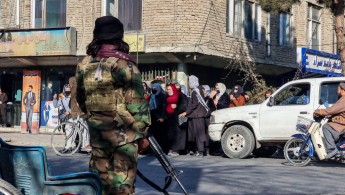Life in Taliban's Afghanistan 'humanitarian and human rights nightmare' two years after takeover
Life in Afghanistan under the Taliban is a "humanitarian and human rights nightmare", Human Rights Watch (HRW) has said as the two-year anniversary of the hardline Islamist group's takeover of the country approaches.
The Taliban have strengthened their unyielding restrictions on women and girls' rights and the media since returning to power in Afghanistan almost two years ago, HRW said in a press release on Thursday.
Women and girls have been denied their rights to education, work, movement and assembly, while the media has been censored and journalists detained in increasing numbers, the rights group said.
HRW Afghanistan researcher Fereshta Abbasi said: "People in Afghanistan are living a humanitarian and human rights nightmare under Taliban rule.
"The Taliban leadership needs to urgently reject their abusive rules and policies, and the international community needs to hold them accountable for the current crises."
The Taliban took over the Afghan capital of Kabul on 15 August, after seizing control of much of Afghanistan in a matter of weeks.
The situation in Afghanistan is among the worst humanitarian crises anywhere in the world and more than 28 million people urgently need assistance.
The Taliban in December announced a ban on women working with NGOs and the UN, with exemptions in areas including health.
This ban has "severely harmed" women's livelihoods, HRW said, because it is impossible to tell whether women are receiving assistance if they are not taking part in the distribution and monitoring processes.
Abbasi said: "The Taliban's misogynist policies show a complete disregard for women’s basic rights.
"Their policies and restrictions not only harm Afghan women who are activists and rights defenders but ordinary women seeking to live a normal life."
Donor states must find ways of mitigating the country's humanitarian crisis without reinforcing the Taliban's repressive policies on women, HRW said.
The rights group added that severe restrictions on local media, such as blocking international media broadcasting, have impeded access to information in Afghanistan.
"No one inside the country can report critical information without fear of arbitrary arrest and detention," HRW said.





 Follow the Middle East's top stories in English at The New Arab on Google News
Follow the Middle East's top stories in English at The New Arab on Google News


